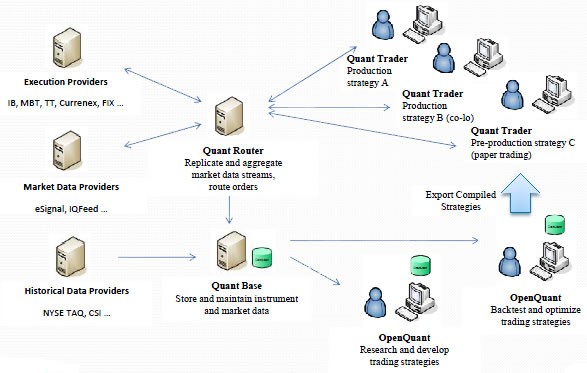Quant Strategies Are They For You Yahoo India Finance
Post on: 3 Июль, 2015 No Comment

Quantitative investment strategies have evolved into very complex tools with the advent of modern computers, but the strategies’ roots go back over 70 years. They are typically run by highly educated teams and use proprietary models to increase their ability to beat the market. There are even off-the-shelf programs that are plug-and-play for those seeking simplicity. Quant models always work well when back tested, but their actual applications and success rate are debatable. While they seem to work well in bull markets, when markets go haywire, quant strategies are subjected to the same risks as any other strategy.
The History
One of the founding fathers of the study of quantitative theory applied to finance was Robert Merton. You can only imagine how difficult and time-consuming the process was before the use of computers. Other theories in finance also evolved from some of the first quantitative studies, including the basis of portfolio diversification based on modern portfolio theory. The use of both quantitative finance and calculus led to many other common tools including one of the most famous, the Black-Scholes option pricing formula, which not only helps investors price options and develop strategies, but helps keep the markets in check with liquidity.
When applied directly to portfolio management, the goal is like any other investment strategy: to add value, alpha or excess returns. Quants, as the developers are called, compose complex mathematical models to detect investment opportunities. There are as many models out there as quants who develop them, and all claim to be the best. One of a quant investment strategy’s best-selling points is that the model, and ultimately the computer, makes the actual buy/sell decision, not a human. This tends to remove any emotional response that a person may experience when buying or selling investments.
Quant strategies are now accepted in the investment community and run by mutual funds, hedge funds and institutional investors. They typically go by the name alpha generators, or alpha gens.
Behind the Curtain
Just like in The Wizard of Oz, someone is behind the curtain driving the process. As with any model, it’s only as good as the human who develops the program. While there is no specific requirement for becoming a quant, most firms running quant models combine the skills of investment analysts, statisticians and the programmers who code the process into the computers. Due to the complex nature of the mathematical and statistical models, it’s common to see credentials like graduate degrees and doctorates in finance, economics, math and engineering.
Historically, these team members worked in the back offices, but as quant models became more commonplace, the back office is moving to the front office.
Benefits of Quant Strategies
While the overall success rate is debatable, the reason some quant strategies work is that they are based on discipline. If the model is right, the discipline keeps the strategy working with lightning-speed computers to exploit inefficiencies in the markets based on quantitative data. The models themselves can be based on as little as a few ratios like P/E, debt to equity and earnings growth, or use thousands of inputs working together at the same time.
Successful strategies can pick up on trends in their early stages as the computers constantly run scenarios to locate inefficiencies before others do. The models are capable of analyzing a very large group of investments simultaneously, where the traditional analyst may be looking at only a few at a time. The screening process can rate the universe by grade levels like 1-5 or A-F depending on the model. This makes the actual trading process very straightforward by investing in the highly rated investments and selling the low-rated ones.
Quant models also open up variations of strategies like long, short and long/short. Successful quant funds keep a keen eye on risk control due to the nature of their models. Most strategies start with a universe or benchmark and use sector and industry weightings in their models. This allows the funds to control the diversification to a certain extent without compromising the model itself. Quant funds typically run on a lower cost basis because they don’t need as many traditional analysts and portfolio managers to run them.
Disadvantages of Quant Strategies

There are reasons why so many investors do not fully embrace the concept of letting a black box run their investments. For all the successful quant funds out there, just as many seem to be unsuccessful. Unfortunately for the quants’ reputation, when they fail, they fail big time.
Long-Term Capital Management was one of the most famous quant hedge funds, as it was run by some of the most respected academic leaders and two Nobel Memorial Prize-winning economists Myron S. Scholes and Robert C. Merton. During the 1990s, their team generated above-average returns and attracted capital from all types of investors. They were famous for not only exploiting inefficiencies, but using easy access to capital to create enormous leveraged bets on market directions.
The disciplined nature of their strategy actually created the weakness that led to their collapse. Long-Term Capital Management was liquidated and dissolved in early 2000. Its models did not include the possibility that the Russian government could default on some of its own debt. This one event triggered events and a chain reaction magnified by leverage-created havoc. LTCM was so heavily involved with other investment operations that its collapse affected the world markets, triggering dramatic events. In the long run, the Federal Reserve stepped in to help, and other banks and investment funds supported LTCM to prevent any further damage. This is one of the reasons quant funds can fail, as they are based on historical events that may not include future events.
While a strong quant team will be constantly adding new aspects to the models to predict future events, it’s impossible to predict the future every time. Quant funds can also become overwhelmed when the economy and markets are experiencing greater-than-average volatility. The buy and sell signals can come so quickly that the high turnover can create high commissions and taxable events. Quant funds can also pose a danger when they are marketed as bear-proof or are based on short strategies. Predicting downturns. using derivatives and combining leverage can be dangerous. One wrong turn can lead to implosions, which often make the news.
The Bottom Line
Quantitative investment strategies have evolved from back office black boxes to mainstream investment tools. They are designed to utilize the best minds in the business and the fastest computers to both exploit inefficiencies and use leverage to make market bets. They can be very successful if the models have included all the right inputs and are nimble enough to predict abnormal market events. On the flip side, while quant funds are rigorously back tested until they work, their weakness is that they rely on historical data for their success. While quant-style investing has its place in the market, it’s important to be aware of its shortcomings and risks. To be consistent with diversification strategies. it’s a good idea to treat quant strategies as an investing style and combine it with traditional strategies to achieve proper diversification.
More From Investopedia














